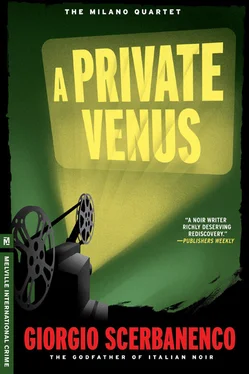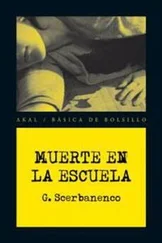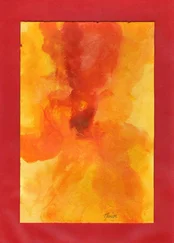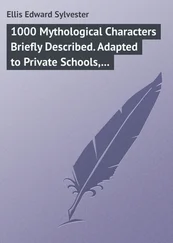Giorgio Scerbanenco - A Private Venus
Здесь есть возможность читать онлайн «Giorgio Scerbanenco - A Private Venus» весь текст электронной книги совершенно бесплатно (целиком полную версию без сокращений). В некоторых случаях можно слушать аудио, скачать через торрент в формате fb2 и присутствует краткое содержание. Жанр: Криминальный детектив, на английском языке. Описание произведения, (предисловие) а так же отзывы посетителей доступны на портале библиотеки ЛибКат.
- Название:A Private Venus
- Автор:
- Жанр:
- Год:неизвестен
- ISBN:нет данных
- Рейтинг книги:3 / 5. Голосов: 1
-
Избранное:Добавить в избранное
- Отзывы:
-
Ваша оценка:
- 60
- 1
- 2
- 3
- 4
- 5
A Private Venus: краткое содержание, описание и аннотация
Предлагаем к чтению аннотацию, описание, краткое содержание или предисловие (зависит от того, что написал сам автор книги «A Private Venus»). Если вы не нашли необходимую информацию о книге — напишите в комментариях, мы постараемся отыскать её.
A Private Venus — читать онлайн бесплатно полную книгу (весь текст) целиком
Ниже представлен текст книги, разбитый по страницам. Система сохранения места последней прочитанной страницы, позволяет с удобством читать онлайн бесплатно книгу «A Private Venus», без необходимости каждый раз заново искать на чём Вы остановились. Поставьте закладку, и сможете в любой момент перейти на страницу, на которой закончили чтение.
Интервал:
Закладка:
With his hair cut and his beard shaved, he started talking to the old barber, looking every now and again at his watch and every now and again at Davide: every minute that passed was a minute less to drink alcohol and a minute more to get reorganised. Perhaps he would sleep until midday, but at 10:15 an old customer came in, a noisy Milanese, the very kind who finds so much success on television, a thin bony man, vaguely hateful for his vulgarity and his wine-red face, who yelled out a Fascist slogan as he entered.
So Davide woke up, realised that he had been asleep, and on the cheek that was free of lather Duca could see the red mark, but the old barber knew his job, he was ready, he finished shaving him and they left.
‘Sorry I took you there,’ Duca said, ‘your usual hairdresser’s may be a more pleasant place.’ He got no answer. He pulled up outside a bar in the Via Plinio. ‘This is the best bar in the area. Order whatever you like.’
He didn’t look at Davide as he drank a double whisky, but only said, ‘Drink slowly, I’m not in any hurry.’
The sleep and the whisky had revived Davide a little. Back in the car, he said, ‘I must be quite a burden to you.’
‘A bit,’ Duca said, driving. ‘But I like you.’ Reaching the Piazza Cavour, he turned into the Via Fatebenefratelli, and parked in the Via dei Giardini. ‘Wait for me here. I have to go to Police Headquarters. I’ll leave the car keys, but remember what I told you this morning: don’t do anything stupid as long as I’m with you. If you’re not here when I get back, I’ll come looking for you, and I hope for your sake I find you already dead, because I don’t rate your chances if I find you alive. And don’t start drinking again.’
Davide nodded his head several times, without smiling. He would be there when Duca got back: he was an honest young man.
As Duca entered Headquarters, the memory of his father hit him like a punch, and a black veil fell over him. Whenever, as a boy, he had come in with his father through that door, crossed that courtyard, climbed those stairs, walked through that corridor and, in the little room, not much more than a cubbyhole, that his father called an office, his father raised his left arm when he could, in other words, not very much after the stab wound he’d got in Sicily, and pointed to the chair, as if it actually was a chair rather than a little bench with a plank as a back and said to him, ‘Sit there and study,’ he would place on his knees the schoolbook that his father had told him to bring, and start to read and reread, and when he needed to write, his father would lend him a corner of his own little table, which passed, however improbably, as a desk. In that way, in that place, he had studied many aspects of infinitesimal calculus, chemistry, and even projective geometry.
But this morning he walked along a different corridor, a more silent, deserted one, there was only one officer outside the door of Carrua’s office. A new officer who, before letting him in, wanted a lot of explanation and looked as if he might want to search him. In the end, Carrua himself came out, shouting.
‘You let in all kinds of nuisances I don’t want to see and when a friend of mine comes you keep them outside.’ Carrua may never have spoken normally, he either shouted or kept silent. ‘How did it go with Auseri?’ he screamed at Duca as soon as they were inside the office.
He told him how it had gone and thanked him for finding him the job. ‘It’s quite an unusual job, but I like it, even though it’s not very clear-cut.’
‘What’s not very clear-cut about it?’
‘I find it hard to believe it’s all about a young man who drinks. There must be something else.’
‘What kind of thing?’
‘I don’t know. The kind that might also be of interest to the police.’
Silence. Superintendent Luigi Carrua was looking at him. He was an old friend of his father’s, Duca must have been five or six years old the first time he had looked at him, and since then they had met on thousands of occasions and Carrua had looked at him thousands of times, but he still couldn’t get used to that look: when Carrua looked at you, you felt naked. He was short, not fat, weighed down by thirty years of police work, even though grey his hair was long and neatly back-combed, without a receding hairline, and he looked more like a bank official than a police officer. Except when he stared into your eyes. ‘If you take after your father,’ he said in an unusually low voice, ‘then maybe there is something. Your father was never wrong.’ He raised his voice again. ‘But you’re a doctor, not a policeman. The Auseris would never have anything to do with the police.’ The telephone rang, he picked it up and listened, then shouted again, ‘All right, let them do the post-mortem again, I’m not the bloody sawbones.’ He turned back to Duca and shrugged. ‘They still say Superintendent Carrùa. That was another one. They’ve known me for ten years and every day I tell them: Càrrua, please, with the stress on the first a , not Carrùa with the stress on the u , but it never works: Carrùa is what they have in their heads and Carrùa is what they say.’
He smiled. The man’s one weakness was the correct pronunciation of his name: it was his secret wound and one that seemed likely never to heal, because people instinctively said Carrùa and it never even occurred to them that they should be pronouncing it Càrrua. He became serious again, he seemed upset.
No, Duca didn’t like the job. ‘If, while looking after this young man, I end up discovering something not entirely above board, what should I do? Engineer Auseri is your friend.’
The shout this time was more forceful. ‘You won’t discover anything because there’s nothing to discover about Auseri. We were at school together, we did our military service together, we’re growing old together in this filthy world, he has a son who’s a bit backward, but who won’t even step off the pavement if the light isn’t green. Auseri’s son drinks because he’s backward, that’s all. But you, being the intelligent man you are, will teach him to prefer lemon juice.’
Then Duca laid it out for him clearly, because what was the point in life of being the son of a policeman, or the protégé of a highly placed official in Headquarters, if the wheels got jammed and you were crushed anyway? They had got jammed with Signora Maldrigati, and he didn’t want to be crushed again. ‘Listen to me. Maybe I won’t discover anything, which will be better for me, but if I discover the slightest thing, I’ll come here and bring it to you on a silver platter and resign from this job. I don’t want to have anything to do with people or things that are outside the law. That’s not an excessive demand, is it?’
Instead of the shouting he was expecting, silence. For a long time. Then Carrua stood up abruptly and at last screamed, ‘You must have a reason to think there’s something there that’s outside the law.’
‘I didn’t want to tell you, because maybe it isn’t a reason,’ he replied loud and clear, ‘but last night your friend’s son tried to kill himself by slitting his wrists. I found him just in time. He’s outside right now, alive and well, waiting for me. But a young man that age doesn’t try to die if there isn’t some underlying cause.’
‘And didn’t he tell you why?’
‘No, just as for the past year he hasn’t told his father why he drinks like that, without any friends or acquaintances driving him to it. And the more I asked him, the less he would tell me.’
‘A lot of people kill themselves for no reason.’
‘Davide Auseri isn’t a young girl who’s been seduced. He may be young, but he’s a man. And he isn’t backward, as you think, or as his father thinks. If he wants to die he has a serious reason, and serious reasons, for a man, always have something to do with the law. I’ve already had enough dealings with the law. Which is why I’ve come here to tell you that, if there’s something not right about this, I’m dropping everything.’
Читать дальшеИнтервал:
Закладка:
Похожие книги на «A Private Venus»
Представляем Вашему вниманию похожие книги на «A Private Venus» списком для выбора. Мы отобрали схожую по названию и смыслу литературу в надежде предоставить читателям больше вариантов отыскать новые, интересные, ещё непрочитанные произведения.
Обсуждение, отзывы о книге «A Private Venus» и просто собственные мнения читателей. Оставьте ваши комментарии, напишите, что Вы думаете о произведении, его смысле или главных героях. Укажите что конкретно понравилось, а что нет, и почему Вы так считаете.












